














FEATURE SUPPLEMENT l 15 www.times-age.co.nz THURSDAY, MARCH 28, 2024 MARCH 2024 EDITION RURAL OUTLOOK PHOTO/TEGAN MITCHELL Seeking government signals P16 | Tough but positive P17 | Logging impacts P21 Farm succession P22 | Window for water leadership P25 | Workforce pipelines P26 FOR All ENQUIRIES CONTACT US ON: PH 06 379 7953 148 BELVEDERE ROAD, CARTERTON Irrigation/Solutions All Pumping Solutions Water Filtration/Pumps Effluent Design/Ponds/ Storage Tanks Installation/Maintenance FOR ALL YOUR ELECTRICAL AND PUMPING REQUIREMENTS Rural, Domestic, Industrial, Commercial EFFLUENT - CUSTOM DESIGNS - Your Needs - Our Solutions - IRRIGATION
Where to next?






Our farmers and growers operate in an environment of climate change and increased scrutiny about the impacts of the primary sector on our environment, and so are leading the way in farming practices. Primary industries are part of the DNA of Wairarapa.
agricultural emissions pricing to help manage greenhouse gas emissions. The latter could either be through a farm-level split gas emissions levy or through the application of the overarching NZ Emissions Trading Scheme.
was just under nine percent, according to the economic consultancy rm Infometrics.
David says that “the complexity, pace, and scope of regulatory change raises issues for the region. If farming is to continue to positively contribute both regionally and nationally, we need to slow these changes down.”
the future. We support the idea of Farm Plans. But let’s put in place a high trust model that educates, supports, audits, and then reprimands just the non-compliers instead of a model that drowns us all in compliance and cost.”
David Hayes, President of Federated Farmers Wairarapa, says “the new government has signalled” that signi cant changes are on the way for at least some of these rules. While they sit on the books, however, councils face legal pressure to implement them and they’re looming over us.”


Federated Farmers is focused on the protection and future of diverse rural communities. David says that “farmers all want to leave a good farm for
He also talks about the priority for Wairarapa of water resilience; both public and onfarm. “A few years ago, we had a proposal that was withdrawn because the planning, red tape, and restrictions made further progress unviable. Promised







But the Ministry for the Environment has said that more action is required to battle nitrogen, phosphorus, sediment, and e-coli through a set of rules called the Essential Freshwater Package. This package includes Freshwater Farm Plans which, the Ministry says, will be able to recognise that one size does not t all.
Alongside Farm Plans are also expectations (either already in place or to be embedded by 2025) relating to stock exclusions, intensive winter grazing requirements, limits to the application of synthetic nitrogen fertiliser, restrictions on stockholding and feedlots, rules to monitor and manage sediment, controls on exotic and plantation forests (and slash and wilding pines), and
The more rigorous regulatory environment has coincided with a time when many farmers are doing it tough in a global market characterised by wars, pressures on supply lines, the slowdown in the Chinese economy and trade, lingering e ects of the pandemic, and associated nancial sector turbulence and in ation. Farmers are tightening their belts, with little left over to invest in complying with new rules.
While the primary industry sector contributed nearly six percent to New Zealand’s overall GDP to March 2023, its contribution to Wairarapa’s GDP
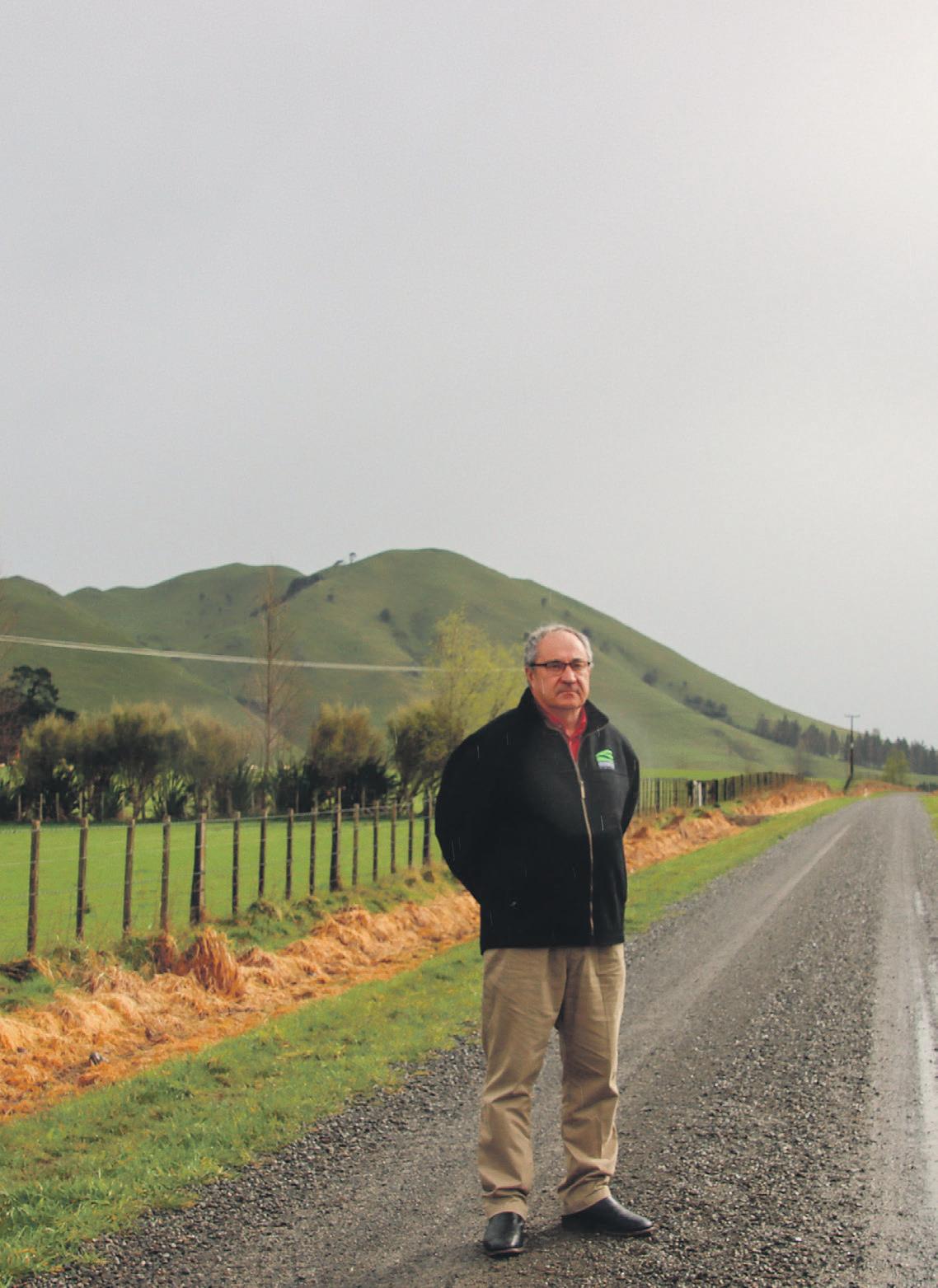















FROM $38,690 - $59,990 + ORC








The powerful all-new, bigger, bolder, top of the range Beast, takes comfort and grunt to new heights. Unlock Beast Mode today at Wairarapa Mitsubishi. *T&C's apply. See instore for details.


16 l FEATURE SUPPLEMENT THURSDAY, MARCH 28, 2024 WAIRARAPA TIMES-AGE 100% LOCAL AND TRUSTED CARE FOR ALL ANIMALS 0800 VET NOW 24 LINCOLN ROAD MASTERTON TVCWAI.CO.NZ ANIMAL HEALTH PLANS RAM PALPATIONS
SCANNING DE HORNING / DISBUDDING PARASITE CONSULTATION
TESTING ON FARM DOG VACCINATIONS
VISIT INSTORE FOR: DRENCH VACCINES NEEDLES, GUNS AND APPLICATORS WORKING DOG FOOD ON FARM SERVICES INCLUDING : Locally owned and operated, Caring seven days a week sales@wairarapamitsubishi.co.nz 0800 ECLIPSE
PREGNANCY
REPRODUCTIVE
PLUS
SALE
WAIRARAPA
MARCH EDITION
PRICE
RURAL OUTLOOK
resource management reform from the new government could change” that. But we’re running out of time to address our water storage needs. We need to progress all the actions in Wairarapa’s Water Resilience Strategy.”
Federated Farmers agrees on the urgency for climate change action but disagrees that regions should set targets that di er from national targets.
“We’re seeking a signal from the government about where to next.”


Doing it tough but staying positive
Sheep and beef farming is an agricultural staple in New Zealand, with over 23,000 sheep and beef farms throughout New Zealand.
Richard Fairbrother is a fth generation Wairarapa farmer, Chairperson of the Wairarapa Federated Farmers’ Meat and Wool Council, and a member of the Rural Advisory Group that advises the Masterton District Council.
“Many sheep and beef farmers are in for a tough year in 2024, with over a 30 percent drop in lamb prices, a 50 percent drop in mutton prices, signi cant increases in on-farm operating costs, disaster recovery costs, and increasing interest rate pressures. Wool is also a cost of doing business rather than a revenue stream these days.”
Richard’s words re ect the Situation and Outlook for Primary Industries (SOPI) published by the Ministry for Primary Industries in December. It forecasts sheep

and beef farm pro t before tax will fall by 31 percent in 2023/24, following a 32 percent decline the year before, due to both lower revenue and higher input costs.
Richard recommends farmers work with their banks to agree on overdraft options and mortgage structures. He mentions one positive: the beef market hasn’t dropped like lamb. “The recent Masterton Saleyards weaner steer, bull, and heifer fairs
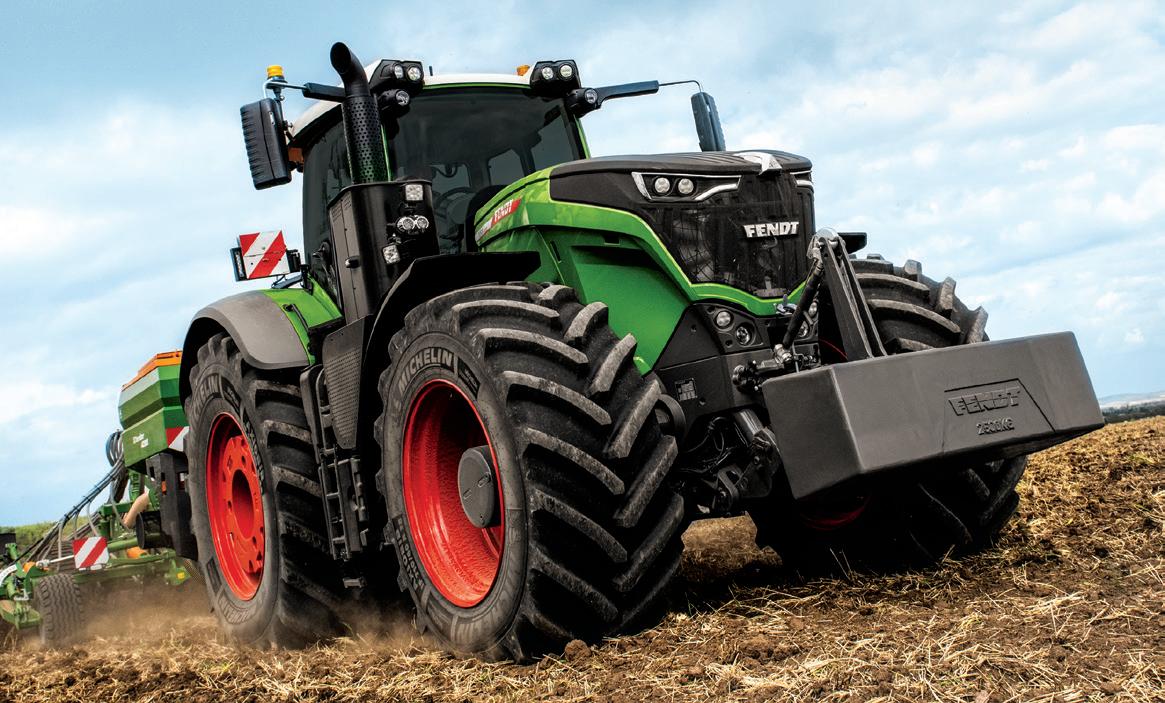

met with good demand, with a lot of cattle sold to farmers based out of the area, farmers who have feed.”
“I came back to run the family farm after working in the fertiliser and banking industries,” he says from his 600-ha sheep and beef farm east of Masterton, where he tends 3000 ewes and 130 breeding cows. “Farmers are used to experiencing the ups and downs of pricing cycles. We know how to work through the tough times,
make plans, and take advice from people they can trust.”
Richard says Wairarapa has experienced a traditionally dry summer but now, into autumn, farmers are looking for some rain. “The nights are getting cooler, and we need some moisture in the ground before the soil temperatures get too low, so that we can grow some grass prior to winter.”
The epicentre of Cyclone Gabrielle in the Wairarapa was Tinui, but other areas were also hit hard, Richard says. “Major issues were land erosion, slips, and landslides, resulting in access issues, stock loss, and fencing damage.”
While farmers got stuck in and started to repair damage, the wet winter saw the ground continue to move, and delayed recovery. The process, like in other districts is ongoing.
“Farmers are motivated to reinstate their properties, but ongoing recovery costs are an issue.”


















FEATURE SUPPLEMENT l 17 www.times-age.co.nz THURSDAY, MARCH 28, 2024 300 High Street, Solway, Masterton Shorty 027 294 5010 • Zac 027 390 9841 06 370 0390 • www.tfmtractors.nz Offer Ends 30 June 2024 Offer Ends 30 June 2024 T&Cs apply. 20% Deposit and 3.49% over 36 months/ 3 year term 20% Deposit and 5.99% over 60 months/ 5 year term OR OR fendt.com/au | Fendt is a worldwide brand of AGCO. 25% Deposit 1.99% over 60 months 25% Deposit 0% Interest over 36 months
QUARTER
DEAL FINANCE DEAL 5700 & 5S & 7600 & 7S Series “Other Finance options also available.”
SECOND
FINANCE
RICHARD FAIRBROTHER ON HIS FARM
DAVID HAYES, PRESIDENT OF FEDERATED FARMERS AT A POSSIBLE WAIRARAPA WATER STORAGE SITE



Quality grass and quality farming practices
John Stevenson runs a 360-ha home farm and another 170-ha farm, milking 1500 cows across the two blocks. He lives and works east of Parkvale and the family farm has ve kilometres of access to the Ruamāhanga River.
in improving e ciency and maximising what we’re growing on-farm, reducing our reliance on external inputs. We’re driven by what our customers want. And what they want aligns with our desire as farmers to leave a sustainable legacy. We’re working with the environment.”






“Our proximity to the river means we have fertile soils,” he says, “but the river also provides us with challenges when it oods.”




Despite the ooding, the farm’s setbacks and practices mean that there is a strong focus on improving water quality and reducing N leaching.
As a fth-generation dairy farmer (second generation on this farm), John is aware of how farming practices have improved. His knowledge and expertise have elevated him to become Wairarapa’s rep for, and Chairperson of, the Fonterra Co-operative Council.
“There’s signi cant investment
Some of the measures John talks about are the regular rotation of grass species, using data to grow the best quality grass possible, planting deeperrooted crops such as turnips and maize when dry summers are forecast, being e cient in the timing and amount of fertiliser applied, and knowing when to spread e uent on the pasture.
“Farmers have had a challenging couple of years with input costs increasing by more than 16 percent. The current midpoint of $7.80 per kilo of milk solids is around breakeven for many. We’re con dent about the long-term viability of dairy, and market volatility is expected to reduce this year, but we’re all looking


hard at where we can reduce costs including feed, fertiliser, capital expenditure, and repairs and maintenance.”
This has ow on impacts for local towns and communities, with other agricultural service businesses a ected.
Katie Wyeth, Vice-President of Federated Farmers, owns a 125-ha farm at Kopuaranga, with another 100-ha leased
just up the road. It was a dairy farm when the Wyeths’ bought it three years ago, but they’ve converted it to a sheep and beef nishing and grazing property. About 16-ha is irrigated, with the rest at or hill country.
of lambs and beef, and dairy heifer and








18 l FEATURE SUPPLEMENT THURSDAY, MARCH 28, 2024 WAIRARAPA TIMES-AGE WAIRARAPA RURAL OUTLOOK MARCH EDITION
breeding
GET YOUR POLE SHED CUSTOM DESIGNED Poleshed design for Shane & Lynette McManaway, Gold Creek Deer Farm, Carterton @ITMGreytown For enquiries and FREE on-site measure, contact our rural Specialist: Mike Turley, 027 412 4234 | Of ce: 06 304 7193 | mike@crightonsgtown.co.nz For enquiries & FREE on-site measure, contact our rural specialist Mike Turley: M: 027 412 4234 | P: 06 304 7193 | E: mike@crightonsgtown.co.nz @ITMGreytown GET YOUR POLE SHED CUSTOM DESIGNED BY THE EXPERTS Poleshed design for Shane & Lynette McManaway, Gold Creek Deer Farm, Carterton GREYTOWN CRIGHTON GET YOUR POLE SHED CUSTOM DESIGNED BY THE EXPERTS @ITMGreytown For enquiries and FREE on-site measure, contact our rural Specialist: Mike Turley, 027 412 4234 | Of ce: 06 304 7193 | mike@crightonsgtown.co.nz GET YOUR POLE SHED CUSTOM DESIGNED BY THE EXPERTS We’re experts in: Irrigation, Municipal Commercial, and Domestic bores. We also provide; Bore servicing, Inspections, Pump installations and Water sampling The team at Griffiths Drilling will help you get the process underway WANT WATER SECURITY...? WANT WATER SECURITY...? 06 304 8989 water@griffithsdrilling.co.nz www.griffithsdrilling.co.nz RESULT DRIVEN HYDROLOGICAL SPECIALISTS B.W. O’BRIEN & CO. LTD. Refrigeration Air conditioning & Heatpumps For all your Farm Refrigeration Needs On Farm Vats, Walk-in Chillers & Freezers, Dairy Refrigeration 138 Dixon Street, Masterton Ph: 06 378 2288 | Mobile: 027 442 5022 Email: of ce@bwo.co.nz www.heatpumpswairarapa.co.nz
“Our focus is on producing high quality protein. It’s a mixed operation with 250
ewes, fattening

hogget grazing. There’s also the potential to grow more horticultural crops such as pumpkins and peas. We want to run a diversi ed system that spreads income and reduces environmental risk.”
Katie says that they’re currently in the process of developing the property. “We’re trying to match the farming and stock policies with the best use of the land. It can get wet in
the winter, so heavy animals at that time of the year are not good for our soils. To run sheep, we need to upgrade the fencing, stock handling, and water systems. We also need to improve drainage, renew pasture species, and continue the fencing o - and riparian planting of - waterways.”
Like John, Katie talks about nancial pressures being “driven by interest rates, high

costs (with on-farm in ation running at about 16 percent), and the dropping of most product prices largely due to international forces.”
She says that beef has held steadier than lamb, a premium product. “We’re an industry that exports most of what we produce. The beef price is underpinned largely by the international price for ground mince.”
In the short-term, Katie says most farming businesses won’t have the ability for new capital investment on-farm. No new machinery, new fencing or infrastructure, or investment in reducing environmental impacts.
“Many businesses are deferring the costs of even basic repairs and maintenance. Some are






not putting on any fertiliser to replace nutrients. And there’s a ow on e ect for the local businesses that support the farming community.”
In the long-term, farmers are resilient, Katie says, and will look at new ways of doing things to become more e cient. Purchasing di erent breeds of sheep, for example, that require less crutching, drenching, and shearing.
Income diversi cation has increasingly become important, too, including agritourism and investing in forestry and carbon credits. More businesses are also looking to develop niche markets for products, such as Coastal Spring Lamb and Atkins Ranch.
“We’ll also be looking at di erent sta ng systems,”
she says, “not just because of the costs, but also because it is becoming more di cult to recruit quali ed sta on farm. The current vocational training model does not serve our industry well.”
Katie echoes the comments made by David Hayes, President of Federated Farmers about the pace and scale of intended regulatory change.
“The international market is driving the direction of travel. NZ farmers have always changed in response to what consumers want as well as to improvements in technology and knowledge. But we can’t always move that fast on farms. We’re farming complex biological systems that take time to change and adapt.”


FEATURE SUPPLEMENT l 19 www.times-age.co.nz THURSDAY, MARCH 28, 2024
KATIE WYETH WITH MIKE BUTTERFIELD ON THE FARM
We can help with: • Batteries • Bearings • Belts • Nuts & Bolts • Grease, Oils & Lubricants • PTO shafts & Gearboxes • Hydraulic Hoses & Fittings • Pins & Bushes Repaired & serviced your gear yet? Book it in now. FARMERS, DID YOU KNOW... Belvedere Road, Carterton Ph 06 379 8044 sales@massons.co.nz Jump into our Open Day
JOHN STEVENSON, PARKVALE DAIRY FARMER























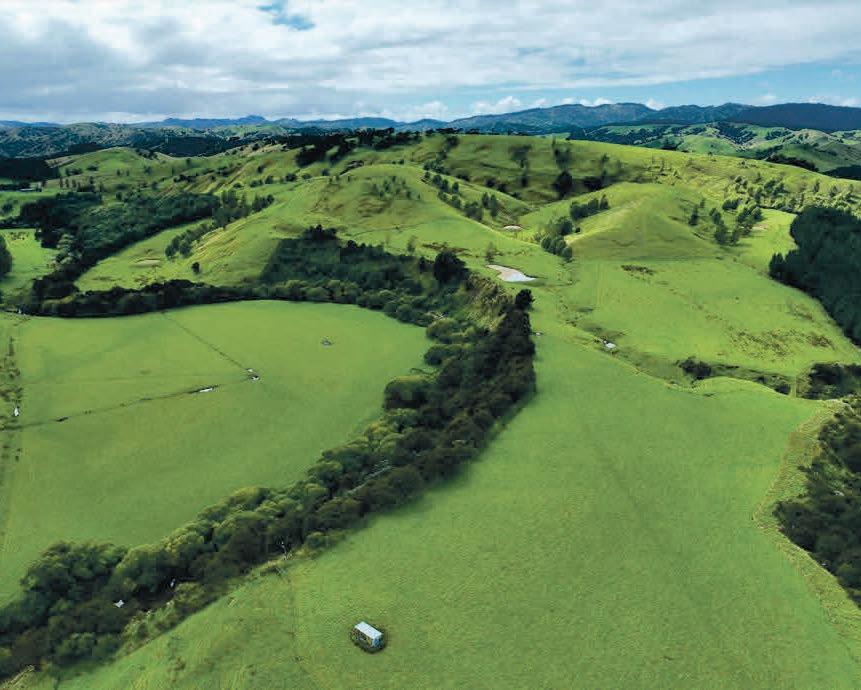
















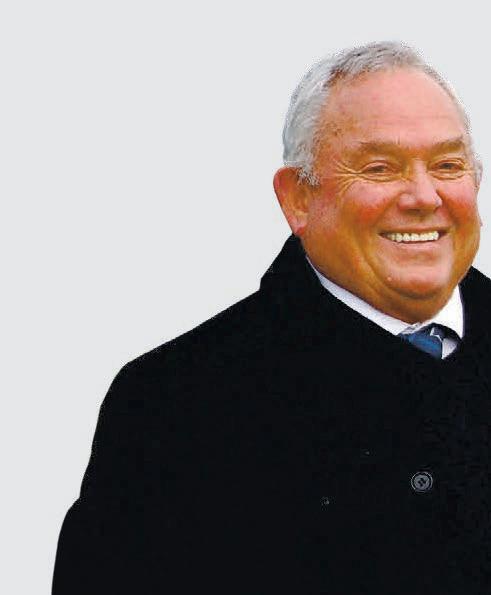



20 l FEATURE SUPPLEMENT THURSDAY, MARCH 28, 2024 WAIRARAPA TIMES-AGE SUCCESS
SOLD IN FEBRUARY SOLD IN FEBRUARY Residential / Commercial / Rural / Property Services
Line
CELEBRATING
Loop
Te Kanuka
Te Roto
Andrew Smith 027 760 8208 Simon Clinton-Baker 021 953 909 Lindsay Watts 027 246 2542
Tosswill Bayleys Masterton 186 Chapel Street, Masterton
The
EASTERN REALTY (WAIRARAPA) LTD, BAYLEYS, LICENSED UNDER THE REA ACT 2008
Mangarei Tarewa Ratanui
Kate
Land is a blue-chip investment and regardless of the current economic outlook, there are still buyers looking to invest in one of the greatest assets you can own, that being land.
reality is that the task to find a buyer in a high interest rate environment takes more e ort, more energy and more strategy as well as the combined teamwork and collaboration of our o ce and our Bayleys o ces throughout the country. We are here to support our rural clients and achieve the best possible outcome for their property.
14ha
54ha
922ha
1,343ha
868ha
46ha
The wood and the trees
Forestry had an export value of $6.4 billion in 2023 and employed about 40000 people.
While MPI forecasts a nine percent drop in forestry export revenue to $5.8 billion in 2024, it also expects a rebound in 2025.
The New Zealand Forest Owners Association has said “our forests are the only credible means of achieving the emissions targets through the ETS.” And while forestry does not object to paying its share of the costs for administering the ETS, increases introduced last year (amounting to an additional $30 million) are said to be “excessive and unreasonable.”
Increased fees come at a time of volatility in the log

market with “ uctuating demand both nationally and internationally,” says Rob Calder, owner of the Wairarapa forestry harvesting business NZ Forest Works.
“The export price used to be xed at the wharf gate every quarter. Now, it’s a monthly schedule with huge variations.”
Regulations are changing regarding slash from forestry harvesting. Rob says that “slash is an inevitable by-product of log harvesting although there may be options for managing it better.” He talks, for example, about chipping the slash at the production site and spreading it over the hill site, “but the machines cost $12000 per day.”
The only other option, he says, is to change the land use again. The advent of the ETS initially caused
some farmers to sell their land to forestry companies or plant it out.
“You can’t blame the farmers,” David Holmes says. He’s a Masterton District Councillor and Chair of the Rural Advisory Group to the council. He says logging is very important to Wairarapa’s economy. David also says, however, that he’s opposed to land sales to foreign companies for carbon credit revenue. “Forestry is a ecting communities like Tinui, gutting them of farming families that used to support the local economies.”
The impact of logging trucks on our rural roads, David says, also needs thought. “The roads are designed to cope with stock trucks making up to three loads a month. By comparison, there can be up to 12 forestry trucks
a day, each with a much heavier weight.”
Because of this, councils are investigating a targeted roading rate for forestry. Currently, road user charges are paid by truck operators into the National Land Transport Fund - over $26 million was allocated from the Fund for Wairarapa roads in the year to June 2024.
Rob says, “logging trucks already pay their dues. If the funds are not being directed back to where they’re most needed, then that’s an issue for the people who allocate them.”
David says that processing logs locally and exporting the processed product by rail to port should be considered. “This would create more industry and employment and also reduce trucks on the hill to Wellington.”









Did you know that in 2018, Masterton District Council established a Rural Advisory Group, tasked with providing advice, information, and recommendations to the Council on a range of topics with a rural focus?
The group meets on a quarterly basis to discuss topics like rates, funding, rural roading, forestry, water resilience, water quality, the Wairarapa Combined District Plan, corporate and spatial planning, civil defence, climate change impacts, coastal issues, and bylaws.
The community members of the group for this term of the Council are:
y Grant Perry
y Alan Emerson
y Ben Seddon
y Richard Fairbrother
y Todd McIlvride
Councillors David Holmes and Craig Bowyer, and Mayor Gary Caffell are also members of the group.
For more about what’s happening at the Council, head to www.mstn.govt.nz





RURAL ADVISORY GROUP – A FEW FACTS


FEATURE SUPPLEMENT l 21 www.times-age.co.nz THURSDAY, MARCH 28, 2024
WAIRARAPA RURAL OUTLOOK MARCH EDITION
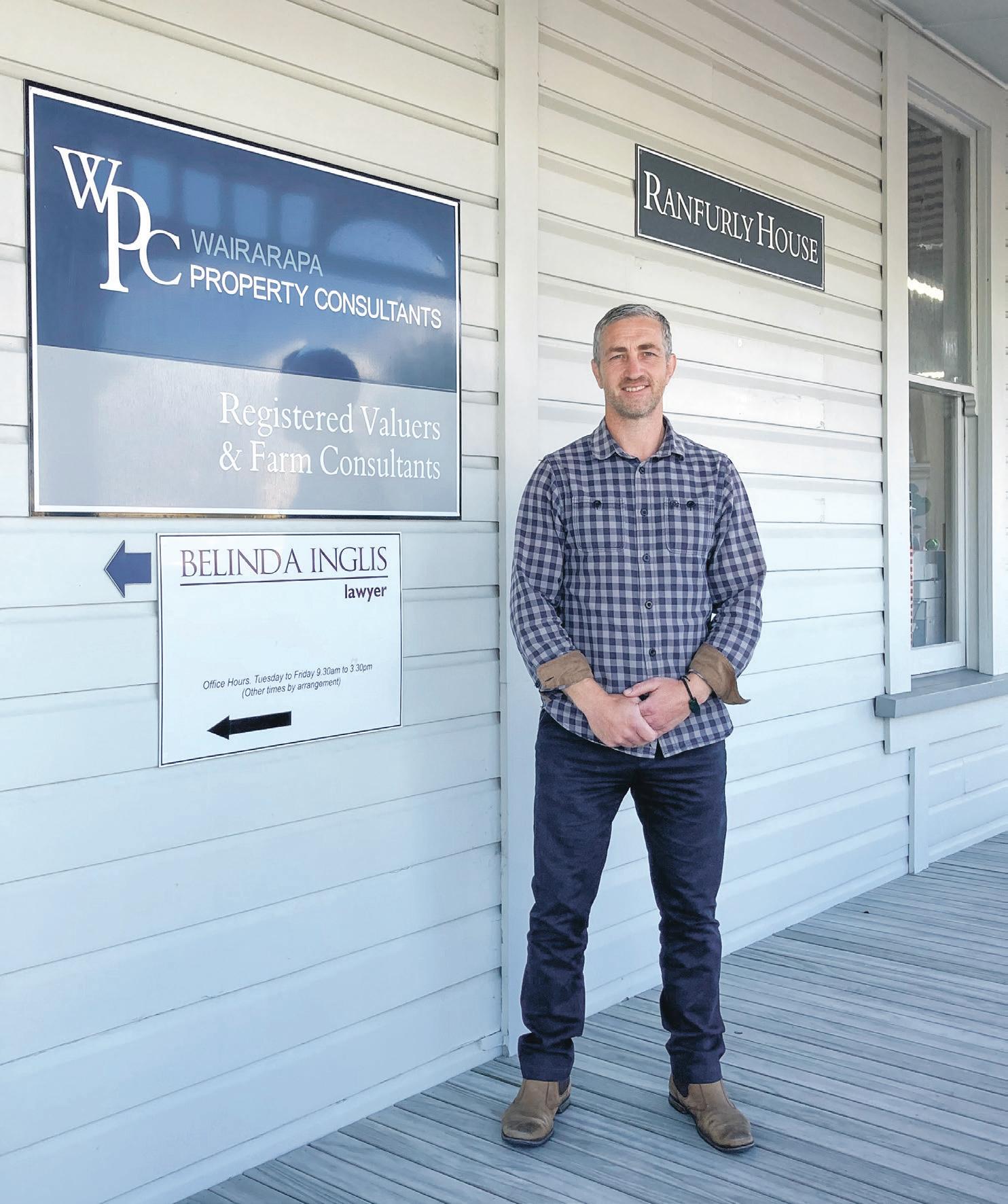
Farm succession and
“20 years ago,” Geordie McCallum says, “it was common for farm succession planning to take place behind closed doors in lawyers’ o ces. That’s no longer the case.
By having an open and transparent process, and by starting early, everyone who needs to can be brought along on the journey.”
With many years in rural banking under his belt, Geordie (a director and rural business consultant for Wairarapa Property Consultants) is wellplaced to help farmers plan for the day they step back from running their farm.

“Right from the beginning of a farm succession journey, it’s important for the current owners to be in control of the planning and the journey.”



The current owners hold the legacy and the responsibility for the succession plan. There are competing interests to balance and the nal say is theirs, based on their values and what they see as fair. The mums and dads are going to need a place to live, a capital bu er for the fun stu and the bad stu , and an income stream for the decades ahead.
“I help farmers get their business ‘succession ready’ before they hand them over. This includes knowing what is required for succession, the current position of the business, and the options for getting from here to there.”
Geordie’s talking about things like performance, pro t, equity, whether more (or less) labour might be required, whether extra debt should be taken on and why, and the establishment of transition milestones.
Glen Eden farm in Ponatahi is an example of a seamless succession from parents Philip


22 l FEATURE SUPPLEMENT THURSDAY, MARCH 28, 2024 WAIRARAPA TIMES-AGE GEORDIE MCCALLUM, RURAL BUSINESS CONSULTANT, OUTSIDE WAIRARAPA PROPERTY CONSULTANTS’ OFFICES
Langlands Motorcycles Ltd www.langlandshonda.co.nz 5 YEAR DOMESTIC WARRANTY# #Terms and Conditions apply, see HUSQVARNA.COM for details. HUSQVARNA.COM Your local authorised Husqvarna Dealer: Greytown Branch: 2491 State Highway 2 P: 06 304 8482 Masterton Branch: 11 Chapel Street P: 06 378 8444 Offer valid from 01/04/24 to 30/06/24 at participating Husqvarna Dealers only, while stocks last. CARRY CASE, CHAIN LOOP & FILING KIT FREE! Receive FREE Blue Chainsaw Carry Case, X-CUT® Chain Loop and Filing Kit, valued over $269 with the purchase of a 435EII, 440EII, 445EII, 450EII, 455R, 460 this season! Free Carry case, chain loop and filing kit valued over $269 $899rrp $999rrp $1349rrp $1219rrp
legacy
and Jo Guscott to son Mark and his wife Susannah. O -farm investments and plantations were provided to Mark’s sisters. Preparation for farm succession began around the year 2000 with the purchase of a neighbouring 400-ha block to make the farm more nancially viable. Another 200-ha was added in 2006, a year after Mark and Susannah took over the farm.
The transition period is the time when the next generation builds its skills and knowledge and takes on more responsibility as the older generation hands over its own skills and knowledge while taking less responsibility. While this is the plan, it can be a challenging process for mum and dad as they move away from a business and an identity that they have built over a lifetime. What can help is having something meaningful to move towards such as another interest, investment, or hobby.



There are many ownership models for farmers to consider. Pathways through the transition phase include contract milking, 50/50 sharemilking, and leasing in the dairy industry, or leasing and share farming in drystock and arable. When talking governance and ownership, equity partnerships are a tool that can provide exibility in the transition.
An independent adviser such as Geordie will always be part of a farm succession team along with a lawyer, an accountant, a banker and, if discussions get tough, a mediator.
Julie Millar, a partner with legal rm Gibson Sheat and Masterton-based, agrees with Geordie that the mums and dads need to drive the process.
She also says, “they’ve most likely lived frugally all their lives, making do with what they’ve got. They tend to carry on that approach when considering the farm succession, but also need to consider their own comforts
and needs for the next few decades.”
Julie works with a team of solicitors with farm succession expertise. They play a support role and do all the paperwork: heads of agreement, securities, loans, gifts, wills, and trusts.
Andrew Freeman was born and raised on a local sheep and beef farm. He trained and worked as a lawyer before returning to the farm, with a deep respect for rural NZ and its hard-working people. A major injury forced a change of track, seeing Andrew retrain as a mediator and facilitator, and transition the ownership of the farm to a company via an equity partnership. He refers to this as a “muscley little farming model.”
Today, Andrew specialises in rural mediation including problem solving in farm succession. It’s easy for disagreements to arise. The assets are big, involve multiple parties, and the issues are often complex. At the end of the





day, if there is no agreement on farm succession then the farm is liquidated, and the money divided up. That’s not succession, its inheritance, and often presents challenges for family roots and community connections.
“The future of the land and the business have enormous merit in their own right,” Andrew says. “Often, it’s as if the farm has its own identity and a voice in the arrangements.”
He starts by seeing if the parties can nd commonality about their values.
“This helps the parties tackle the issues as a shared problem and have con dence about how to assess appropriate and lasting solutions.
“I work with the willing and help create buy-in and certainty,” Andrew says.







































FEATURE SUPPLEMENT l 23 www.times-age.co.nz THURSDAY, MARCH 28, 2024
WAIRARAPA RURAL OUTLOOK MARCH EDITION • Electricians • Water pumps • Water treatment • Milking equipment COTTER & STEVENS Trusted since 1949 35 Jellicoe Street, Martinborough Phone: 06 306 9491 | office@cans.co.nz BROOKS REFRIGERATION SERVICES • Refrigeration • Air-conditioning • Heat pumps • Automotive air con Phone 027 505 8225 brooks.refrigeration@gmail.com Adam Brooks “TEMPERATURE CONTROLLED BETTER” Call Adam today for a no-obligation free quote Loan Chiller available Why NZ Aglime? We are 100% New Zealand owned and operated. All of our products are produced from all-natural limestone, quarried right here in Wairarapa. We don’t use unnecessary additives or chemicals and o er both organic and non-organic options. 0800 879 274 Quarry Manager – Todd Johnson todd@nzaglime.co.nz www.nzaglime.co.nz QUARRY IS OPEN 8AM - 5PM MONDAY - FRIDAY OR BY ARRANGEMENT. 704 Te Wharau Rd, Masterton What We Do Lime Stone 01 Lime Blends Aglime 02 03 Track Lime 04
Standing by



Sarah Donaldson, Area Coordinator for Wairarapa’s Rural Support Trust (RST), who lives on a sheep and beef farm, understands the common challenges that can arise when living and working rurally, not just during natural disasters but also during tough nancial times.
provide practical assistance, and recommend next steps. We also interface with and advocate to other agencies.”
Sheep and beef farmer, Richard Fairbrother, says “the RST did amazing work in the wake of the cyclones, providing emotional, infrastructure, and planning support to the farming communities a ected. The Trust should be commended for its outstanding contribution to the recovery e ort.”









WAIRARAPA RURAL OUTLOOK




“RST’s connections into rural communities go from strength to strength every year,” Sarah says. “People are comfortable calling us. We can solve some problems, walk alongside people who need support,
Wairarapa rural land markets
The Shear4u Shearathon, held in January this year, is held up by Richard as one of the many amazing ways in which our rural communities come together in tough times. Over $100,000 was raised for
Richard Moore leases a 670-ha family sheep and beef farm as part of an equity partnership and is also a registered farm valuer and director at Wairarapa Property Consultants.
He says local markets are “reacting as we would expect, following what has been a perfect storm of market constraints.”





Wairarapa’s RST, Gumboot Friday, and Farmstrong, each of which use the funds to help those most in need in rural Wairarapa.
“In general,” he says, “sale volumes have reduced substantially, and the market has transitioned from a rising sellers’ market to a subdued buyers’ market, particularly within the sheep and beef sector. Forestry participants have pulled back from the market leaving a huge gap in demand.
“We’re currently in a ‘crouch
Richard has some practical advice to farmers, including himself, about looking after mental wellbeing. “It’s important that we get o the farm and pursue other hobbies
and hold’ phase awaiting con rmation of new market levels and the gap to be closed between vendor and purchaser expectations.
“Recent hill country transactions re ect early signs of a substantial price softening, back to pre-2021 values. Other sectors of the market are proving more resilient to declining values.












24 l FEATURE SUPPLEMENT THURSDAY, MARCH 28, 2024 WAIRARAPA TIMES-AGE
MARCH EDITION
LOVE YOUR LAND STIHL SHOP ® Masterton 4 Chapel Street, Masterton, Phone 06 377 5549 ^At participating retailers. *O ers apply on selected products only and are valid from 1 March 2024 to 17 June 2024 or while stocks last. Terms and conditions apply. To qualify for a free second battery on STIHL AP products, you need to purchase a STIHL AP tool plus a battery. To qualify for a free second battery on STIHL AK products, you need to purchase a STIHL AK battery kit. See in-store or online at participating retailers for details. IN THE GARDEN THIS AUTUMN WITH A FREE SECOND BATTERY VALUED UP TO $375* OPENING HOURS: Monday–Friday 7.00am-5.30pm, Saturday 9.00am-1.00pm LOOKS LIKE I’LL BE PULLING EXTRA SHIFTS THIS AUTUMN THINK OF US AS YOUR DOUBLE SHOT ESPRESSO WE DO IT ALL Your motorcycle’s in expert hands with Fagan’s full team of RURAL and ROAD bike technicians! Our RURAL & ROAD specialists o er servicing of all makes and models. 75 Dixon Street, Masterton | P 378 6159 | www.faganmotors.co.nz • WOF's available • Bookings with a fast turn around! Call Je now - 06 378-6159


and interests such as following children’s sports, connecting with friends and family, playing sport, and talking to mates. These things help us get through the tough times.”
“Smaller (under 100-ha) highly productive blocks are selling well, primarily for dairy support use.
“Other emerging sectors such as urban development, aged care, and energy (solar) are providing new opportunities for rural landowners, particularly those close to town.”
Water leadership window is closing
“A huge emphasis on water storage makes a lot of sense for all of Wairarapa,” says John Stevenson, Parkvale dairy farmer. “Urban areas, industry, and farmers all need improved access to water during the challenge that is Wairarapa’s summer, if we are to prosper as a region.”
During our winters, the river ows across John’s land. On the other hand, summer is characterised by long dry spells. “We need to be able to capture and store water when it is plentiful, then distribute it to where it’s needed in dry spells so that we don’t have to take it from the rivers during summer,” he says.
Glen Eden farm includes a circle of crops of all types and with di erent water needs. Owner Mark Guscott currently has consent to




farm storage. The rules need to consider both the design safety and what is reasonable and practicable. We need both small- and large-scale storage.”

take 100 litres a second from the river. He uses his allocation wisely with a farm irrigation system that can sense where water is needed, and how much. “It’s targeted and e cient,” Mark says. Potential future changes to this consented amount, and whether Glen Eden might need to consider building a dam, remain to be seen.
Some farmers say they can’t a ord to build dams. The story of Len French’s e orts


to build a 13-ha dam on his Whareama farm has become the stu of legend. It took him $3 million in investment and ve years of planning due to Kafkaesque regulatory battles.
David Hayes from Federated Farmers says that “even if funding was available to farmers for building dams, New Zealand’s engineering capability will not cope with the likely demand under current rules for smaller on-
David Holmes, Chair of the Water Resilience Committee, is committed to implementing the Wairarapa Water Resilience Strategy and driving water security in the region. He says we need a model “where government subsidises on-farm storage as well as the development of big gravity-fed ponds adjacent to rivers from which users can purchase water.”
“We’re looking for leadership,” Stevenson adds. “We either need local water storage at scale, or individual farmers are going to have to nd ways to store water themselves. The window of waiting for leadership is rapidly closing, so it may be up to us. It will be costly, but we’ll have to balance that against the costs of not doing anything. In that scenario, farms will become unviable.”



































FEATURE SUPPLEMENT l 25 www.times-age.co.nz THURSDAY, MARCH 28, 2024
DIFFERENT CROPS GROWN SIDE BY SIDE AT GLEN EDEN FARM, BASED ON EFFICIENT WATER USE
SURVEYING STORM DAMAGE
SARAH DONALDSON FROM THE RURAL SUPPORT TRUST WITH FEDERATED FARMERS WILLIAM BEETHAM AND FARMER MALCOLM WYETH
Get a
on your
servicing
are available to services all makes & models of tractors, balers, excavators etc, and supply parts for most brands. Our factory trained technicans will ensure you equipment is ready for the season ahead.
give
booked in today. *Terms and conditions apply $ + 10% OFF PARTS AND LABOUR Ryan Candy Branch Manager 027 780 4837 Aaron George Sales 027 312 7489 Power Farming Wairarapa Masterton | 307 High Street | 06 370 8240 *Terms and conditions apply. While stocks last, limited time offer
head start
winter
We
So
us a call and get your winter service
Rural workforce and training pipeline



Nearly 360 thousand people were employed in New Zealand’s food and bre sector in the year to 31 March 2021, representing over 13 percent of the total workforce.
The economic consultancy NZIER projects growth of up to 16 percent to 2032, in primary industry employment, with a trend towards more highly skilled people to support advances in technology and complexity.
Shears every year. They also attend Growing Future Farmers open days and visit Smedley and Otiwhiti Stations.
Learning is on-the-job or via distance study.
UCOL in Masterton o ers on-the-job training and quali cations such as the Certi cate in Animal Wellbeing and the Certi cate in Primary Industry Operational Skills.



But some farmers in Wairarapa say they struggle to attract and retain the next generation of sta . However, opportunities are available to prepare for working in the primary sector.




WAIRARAPA RURAL OUTLOOK






Right along the ‘pipeline’ – from Levels 2 to 6 either while at college or through on-the-job training and at Levels 7 and 8 at university – young people have options for training often while also earning an income. It might be a case of employers and training providers pulling out all the stops to attract young people into the primary sector. Employers who don’t neatly t into training providers criteria many need to think more laterally about their business models.
The college years
Both Wairarapa and Kuranui Colleges provide opportunities for a taste of working with the land. Their students provide voluntary labour to Golden




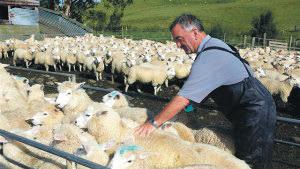


Kuranui entered seven teams in the FMG Young Farmers Competition this year. The school’s Farm Lead runs a farming wananga once a week for her students, during which the school’s one-ha farm is developed. Several students engage in rural work experience including spending two days a week on a sheep and beef farm and completing Telford Unit Standards (through SIT).
Other Kuranui students are enrolled in the Primary Industry Trades Academy involving practical rural experience one day a week. And students get to attend a ‘Forestry Day Out’ and a ‘Day in the Field’.
Next steps
The Primary Industry Training Organisation (PITO) o ers training courses from Level 2 to Level 6 ranging from short courses to certi cates, apprenticeships, and diplomas across primary industry, animal care, vet nursing, equine, dairying, horticultural, farm management, and more.
Growing Future Farmers is a twoyear programme throughout the country that aims to accelerate a graduate’s career from entry-level skills to advanced farm skills.
Learners are provided with accommodation, full training, pastoral care, a sponsorship allowance, and two pups.
Smedley Station and Cadet Training Farm, in the Hawke’s Bay, provides accredited hands-on agricultural and farm courses, although only 13 trainees are accepted each year. Open days are on 8 and 9 June this year.
The next level
Massey University and Lincoln University both o er Level 7 degrees and Level 8 postgraduate quali cations in all aspects of agricultural, horticulture, animal science, veterinary science, and more.








26 l FEATURE SUPPLEMENT THURSDAY, MARCH 28, 2024 WAIRARAPA TIMES-AGE
MARCH EDITION
Do you want to add value to your farming operation? The Falkirk Index System will help you find new levels of performance and profitability. Contact Ian Walsh for more information 07 877 8345 | 0274 809807 falkirk1@xtra.co.nz | www.falkirkgenetics.co.nz FALKIRK QUALITY ANIMAL GENETICS - WORK WITH NATURE AND BLEND WITH SCIENCE Wairarapa’s Rural Building Specialists • Pole Sheds • Garages • Covered Yards • Workshops Everyday LOW PRICES Proud to support provincial New Zealand Mike Butterick MP for Wairarapa 0800 MIKE MP Mike.ButterickMP@parliament.govt.nz Wairarpa, Tararua, Central Hawkes Bay Funded by the Parliamentary Service. Authorised by Mike Butterick, Parliament Buildings, Wgtn.










































































































































































































































































